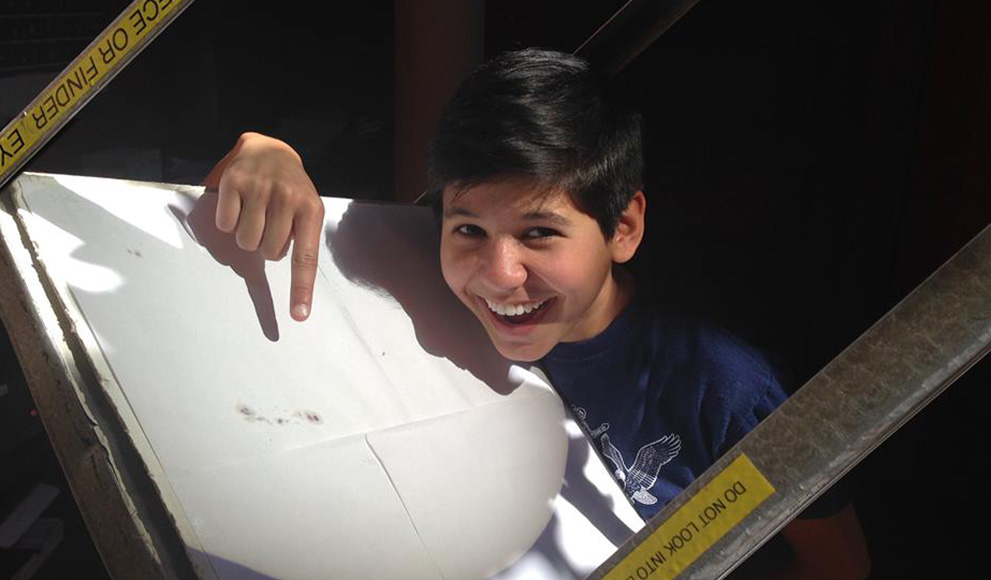Students Observed The Lunar Eclipse and Supermoon And React To News of Water On Mars

After observing some particularly large sunspots, students from the Astronomy Department declared in a Facebook post that Monday was “a great day for astronomy!” Really, it’s been quite a week—the world witnessed a rare celestial event when a lunar eclipse coincided with a "supermoon," and heard some exciting news from NASA with the announcement of evidence of water on the surface of Mars.
"The super blood moon was absolutely amazing," said Jenny Gubner '18. "I love looking at the regular moon through the [Whitin Observatory] telescopes, so looking at the blood moon was breathtaking." She shared one of her photographs of the moon on social media this week.
Gubner observed the lunar eclipse from the Whitin Observatory with other students, including Ashley Iguina '17, and many, many visitors. "The lunar eclipse turned out to be a huge event at the observatory," Gubner said. "We ended up opening up the telescopes to the hundreds of people that showed up...it was cool to see so many people, who don't necessarily know much about astronomy, showing an interest in using the telescopes and learning about the moon and the solar system."
Iguina said it was her first time viewing an eclipse. "Even before the moon turned red, seeing the earth's round shadow on the moon during partial eclipse was enough to make me jump with excitement," she said.
Anicia Arredondo '16 had a slightly different vantage point from which to view the eclipse. "Our lab instructor, Steve Slivan, was kind enough to take some of us to MIT’s Wallace Observatory in Northern Massachusetts," Arredondo said. "The observing site was far from the lights of Boston, and so we were able to get an awesome view of the Milky Way while the Moon was dimmed. We took a few telescopes and cameras with us and we were able to take some pretty amazing photos of the Moon."
Arredondo, Gubner and Iguina all also expressed excitement about the news from NASA this week that there is evidence liquid water exists on Mars. "This is an amazing discovery with many implications about life on other planets and the future of humanity," Arredondo said. "This discovery is our generation’s Moon landing."
Gubner said she is excited about what implications this new discovery may have for the solar system and the universe. "If Earth's neighboring planet likely has water, there must be billions of other planets in the universe that have water as well. In that case life on another planet is almost guaranteed. I am excited to see the research on Mars progress and can't wait until we finally send humans to explore the amazing red planet," she said.
Another student, Abigail Harrison ‘19, hopes to be part of the first crew that lands on Mars. Harrison, known to many as Astronaut Abby, recently launched The Mars Generation, a non-profit focused on advocating for NASA's Journey to Mars and advancing public interest in space exploration.
"Going to Mars is my dream, but even more than that is the importance of us getting to Mars as a society," Harrison recently told Space.com. "So when it comes down to it, the work that I am trying to do now and that I hope and intend to do until the Mars launches happen, is not really about me but about someone getting to Mars."
For students interested in learning more about, or one day going to Mars, and for those interested in exploring the stars, planets and far reaches of outer space with their feet planted on Earth, the Astronomy department offers many ways to explore the field. Through classes, of course, but also through public events and programming. Students can also join the A.S.T.R.O. club.
"The astronomy and physics departments are amazing," Gubner said. "The professors are so supportive and genuinely care about the successes of their students. They are willing to help in specific material, as well as offer very unique and exciting opportunities for research and studies... Already I have been granted amazing opportunities, experiences, and resources that have made me love astrophysics even more and made me more curious about the universe."
